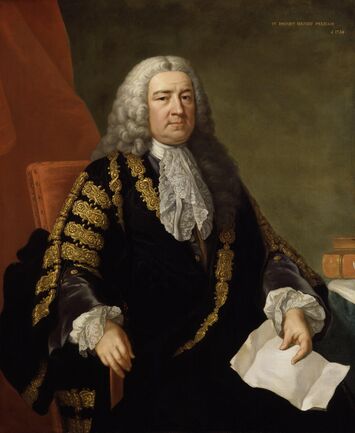More languages
More actions
Henry Pelham | |
|---|---|
 | |
| Born | 25 September 1694 Laughton, Sussex, England |
| Died | 6 March 1754 (aged 59) Westminster, England |
| Political party | Whig |
Henry Pelham was a former British Prime Minister serving from 27 August 1743 until his death on 6 March 1754. He was succeeded as Prime Minister by his older brother Thomas-Pelham Holles who had worked with him in government.
Early Life[edit | edit source]
Henry Pelham was the second surviving son of Thomas Pelham, first Baron Pelham of Laughton, and his second wife Lady Grace Holles. Pelham was educated at Westminster School and Hart Hall (now Hertford College), Oxford. His father’s death in 1712 brought him cash and land in the family’s home county of Sussex.
Pelham volunteered for the army during the pro-Stuart Jacobite rising of 1715, commanding dragoons at the Battle of Preston.[1]
Political Career[edit | edit source]
He spent time travelling in Europe before becoming Whig MP for Seaford in Sussex, thanks to his brother’s patronage. He held this seat until 1722 when he was elected as one of the County members for Sussex, holding this seat until his death.
His brother’s patronage also helped him acquire his first major office in 1720, as Treasurer of the Chamber but, following Walpole’s appointment as First Lord, Pelham took a seat on the Treasury Board. Pelham and his brother were key allies of Walpole in his struggle for control of the administration and he was rewarded by being appointed Secretary at War from 1724 and becoming a Privy Councillor in 1725.
He became Paymaster of the Forces in 1730 and served as one of Walpole’s senior lieutenants in the House of Commons. Following Walpole’s fall in 1742, Pelham became leader of the Walpolean faction, known as the Old Corps Whigs, in the Commons.[1]
Premiership[edit | edit source]
Following Spencer Compton’s death Pelham succeeded him as First Lord in July 1743, and subsequently became Chancellor of the Exchequer as well. After Walpole’s fall, Pelham, along with Newcastle and Philip Yorke, were the mainstays of the government.[1]
In July 1745 Charles Stuart led the last Jacobite Rebellion in an attempt to restore the House of Stuart as the British Monarchs before being defeated in June 1746. Following the rebellion, Pelham's Government started a campaign of ethnic cleansing against the Scottish highlander population, supressing their culture and forcibly removing them from their land.[2]
Pelham's focus during his tenure was domestic affairs, particularly financial ones, and as head of the Treasury, Pelham’s instincts were always towards reducing expenditure, and discouraging spending on wars and alliances with Europe. In line with his low spending policy, he succeeded in passing a scheme to consolidate the national debt and reduce the interest rate in 1749.
He died in March 1754, shortly before the General Election, and was succeeded by his elder brother Thomas-Pelham Holles.[1]
References[edit | edit source]
- ↑ 1.0 1.1 1.2 1.3 Andrew Thompson (2014-12-17). "Henry Pelham (Whig, 1743-1754)" GOV.UK.
- ↑ "Scotland Back in the Day: How the brutal atrocities of the Highland Clearances changed Scotland forever" (2016-07-19). The National.
